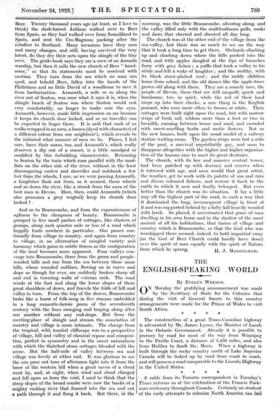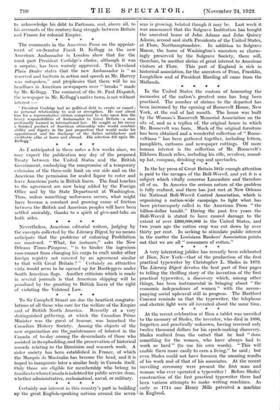THE
ENGLISH-SPEAKING WORLD,
By EVELYN WRENCIL ON Monday the gratifying announcement was made by the Secretary -of State for the Colonies that during the ...visit of General Smuts to this country arrangements were made for the Prince of Wales to visit South Africa.
* * The construction of a great Trans-Canadian highway is advocated by Mr. James Lyons, the Minister of Lands in the Ontario Government. Already it is possible to journey by road for most of the way from Winnipeg to the Pacific Coast, a distance of 1,250 miles, and also from Halifax to Sault Ste. Marie. When a highway is built through the rocky country north of Lake Superior Canada will be linked up by road from coast to coast, and will possess a road comparable to the Lincoln Highway in the United States.
_ A cable from its Toronto correspondent in Tuesday's Times informs us of the -celebration; of the Francis Park- man centenary throughout Canada. Certain(); no student of the early attempts to colonize North America can fail to acknowledge his debt to Parkman, and, above all, to his accounts of the century-long struggle between Britain and France for colonial Empire.
The comments in the American Press on the appoint- ment of ex-Senator Frank B. Kellogg as the new American Ambassador in London show that for the most part President Coolidge's choice, although it was a surprise, has been warmly approved. The Cleveland Plain Dealer states that the new Ambassador is " as reserved and taciturn in action and speech as Mr. Harvey was outspoken," and prophesies that there will be no headlines in American newspapers over " breaks " made by Mr. Kellogg. The comment of the St. Paul Dispatch, the newspaper in Mr. Kellogg's native town, is not without interest :- " President Coolidge had no political debt to create or cancel ; no personal relationship to seal or strengthen. He cast about him for a representative citizen competent to take upon him the heavy responsibilities of Ambassador to Great Britain—a man profoundly learned in international law. He sought as his envoy a finished product of American citizenship who would combine ability and dignity in the just proportion that would make his appointment and his discharge of the duties satisfactory and creditable alike at home and abroad. His selection fell upon Mr.
Kellogg."
* * * * As I anticipated in these notes a few weeks since, we may expect the publication any day of the proposed Treaty between the United States and the British Government, embodying the compromise of a temporary extension of the three-mile limit on our side and on the American the permission for sealed liquor to enter and leave American ports in British liners. The final touches to the agreement are now being added by the Foreign Office and by the State Department at Washington. Thus, unless something unforeseen occurs, what might have become a constant and growing cause of friction between the British and American peoples will have been settled amicably, thanks to a spirit of give-and-take on both sides. * * * * Nevertheless, American editorial writers, judging by the excerpts collected by the Literary Digest, by no means anticipate that the problems of enforcing Prohibition are mastered. " What, for instance," asks the New Orleans Times-Picayune, " is to hinder the ingenious rum-runner from changing his cargo to craft under other foreign registry not covered by an agreement similar to that with Great Britain ? " Certainly an attractive vista would seem to be opened up for Bootleggers under South American flags. Another criticism which is made in several journals is that American shipping will be penalized by the granting to British liners of the right of violating the Volstead Law.
* * * * To Sir Campbell Stuart are due the heartiest congratu- lations of all those who care for the welfare of the Empire and of British North America. Recently at a very distinguished gathering, at which the Canadian Prime Minister was the guest of honour, was launched the Canadian History Society. Among the objects of the new organization are the maintenance of interest in the Canada of to-day among the descendants of those who assisted in its upbuilding, and the preservation of historical records relating to the Dominion and research work. A sister society has been established in France, of which the Marquis de Montcalm has become the head, and it is hoped to inaugurate later a similar body in Canada itself. Only those are eligible for membership who belong to families to whom Canada is indebted for public service done, whether administrative, ecclesiastical, naval, or military. * * * * Certainly our interest in this country's part in building up the great English-speaking nations around the seven seas is growing, belated though it may be. Last week it was announced that the Sulgrave Institution has bought the ancestral home of John Adams and John Quincy Adams, second and sixth Presidents of the United States, at Flore, Northamptonshire. In addition to Sulgrave Manor, the home of Washington's ancesters so charm- ingly preserved by the Sulgrave Society, there will, therefore, be another shrine of great interest to American visitors at Flore. This part of England is rich in historical association, for the ancestors of Penn, Franklin, Longfellow and of President Harding all came from the Midlands. * * * * In the United States the custom of honouring the memories of the nation's greatest sons has long been practised. The number of shrines to the departed has been increased by the opening of Roosevelt House, New York, at the end of last month. The house was built by the Woman's Roosevelt Memorial Association on the site of, and as a replica of, the original house in which Mr. Roosevelt was born. Much of the original furniture has been obtained and a wonderful collection of " Roose- veltiana " has been gathered together, including letters, pamphlets, cartoons and newspaper cuttings. Of more human interest is the collection of Mr. Roosevelt's Elkhorn Ranch relics, including' his rifle, revolver, round- up hat, compass, drinking cup and spectacles. * * * * In the lay press of Great Britain little enough attention is paid to the ravages of the Boll-Weevil, and yet it is a subject which vitally concerns Lancashire and therefore all of us. In America the serious nature of the problem is fully realized, and there has just met at New Orleans the National Boll-Weevil Control Association. , which is organizing a nation-wide campaign to fight what has been picturesquely called in the American Press " the billion-dollar bandit." During the past -five years-the Boll-Weevil is stated to have caused damage to the extent of over 2300,000,000 in the United States, and two years ago the cotton crop was cut down by over thirty per cent. In seeking to stimulate public interest in the matter the Louisiana Bankers' Association points out that we are all " consumers of cotton."
* * * * A very interesting jubilee has recently been celebrated at Ilion, New York—that of the production of the first practical typewriter by Christopher L. Sholes in 1873. The Literary Digest devotes the best part of four pages to telling the thrilling story of the invention of the first practical typewriter, a discovery which, among other things, has been instrumental in bringing about " the economic independence of women " with the accom- panying social upheaval still in progress. The Hartford Courant reminds us that the typewriter, the telephone and electric light were all invented about the same time. * * * At the recent celebration at Ilion a tablet was unveiled to the memory of Sholes, the inventor, who died in 1890, forgotten and practically unknown, having received only twelve thousand dollars for his epoch-making discovery. Sholes realized from the outset that he had " done something for the women, who have always had to work so hard " (to use his own words). " This will enable them more easily to earn a living," he said ; but even Sholes could not have foreseen the amazing results of his work and of that of his associates. At the recent unveiling ceremony were present the first man and woman who ever operated a typewriter ! Before Sholes' construction of the first practical typewriter there had been various attempts to make writing machines. As early as 1714 one Henry Mills patented a machine in England.



















































 Previous page
Previous page